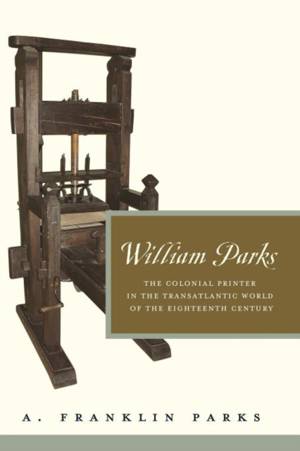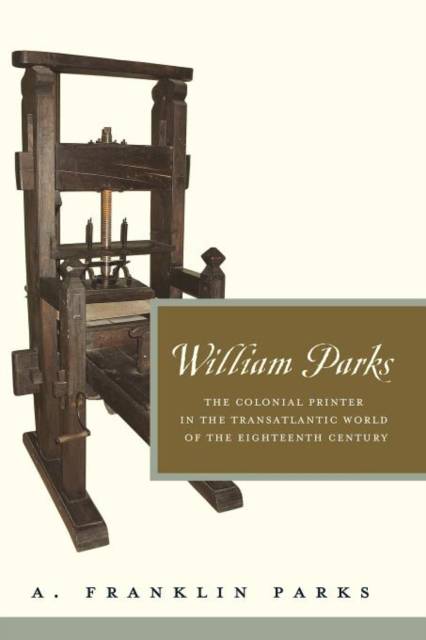
- Retrait gratuit dans votre magasin Club
- 7.000.000 titres dans notre catalogue
- Payer en toute sécurité
- Toujours un magasin près de chez vous
- Retrait gratuit dans votre magasin Club
- 7.000.0000 titres dans notre catalogue
- Payer en toute sécurité
- Toujours un magasin près de chez vous
William Parks
The Colonial Printer in the Transatlantic World of the Eighteenth Century
A Franklin ParksDescription
William Parks: The Colonial Printer in the Transatlantic World of the Eighteenth Century is a cultural biography that traces the important early American printer and newspaper publisher's path from the rural provinces of England to London and then to colonial Maryland and Virginia. While incorporating much new biographical information, the book widens the lens to take in the print culture on both sides of the Atlantic--as well as the societal pressures on printing and publishing in England and colonial America in the early to mid-eighteenth century, with the printer as a focal point.
After a struggling start in England, William Parks became a critical figure for both Annapolis and Williamsburg. He provided the southern United States with its first newspapers as well as civic leadership, book printing and selling, paper, and even postal services. Despite Jefferson's later dismissal of his Williamsburg newspaper as simply a governmental organ, Parks often pushed the limits of what was expected of a public printer, occasionally getting into trouble and confronting the kind of control and censorship that would eventually make evident the need for press freedoms in the new republic. It has often been asserted that, had Parks not died unexpectedly and relatively young, his reputation would have rivaled that of Franklin as a printer, entrepreneur, and man of affairs.
Spécifications
Parties prenantes
- Auteur(s) :
- Editeur:
Contenu
- Nombre de pages :
- 232
- Langue:
- Anglais
- Collection :
- Tome:
- n° 18
Caractéristiques
- EAN:
- 9780271052120
- Date de parution :
- 15-03-16
- Format:
- Livre broché
- Format numérique:
- Trade paperback (VS)
- Dimensions :
- 152 mm x 229 mm
- Poids :
- 349 g

Les avis
Nous publions uniquement les avis qui respectent les conditions requises. Consultez nos conditions pour les avis.






